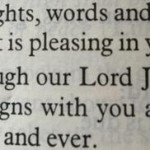Dr. Mark D. Roberts recently wrote about Psalm 137:9, a verse which he said makes us most uncomfortable:
The verse is “He shall seize and shall dash your children on the rock!” and of it, Robert’s writes:
How can any part of Scripture seem to celebrate the killing of babies? How in the world are we to make sense of this verse? How can we read it, not to mention pray it, as Christians? Didn’t Jesus call us to love our enemies and forgive them, not smash their babies against the rocks? How are we supposed to answer the opponent of Christianity who throws Psalm 137:9 in our faces?
In his devotional, Roberts lists five ways for the verse to be looked, covering the realities of the Babylonian exile and what may have been experienced at their hands, the human sense for revenge-as-justice and the applicable lessons of grace, and Christ working through us.
Maybe it’s because I am a Catholic with an abundance of rowdy ethnic residue, I have never once been made uncomfortable about that verse. Quite the opposite, the entire psalm brings me enormous consolation, each time I read it, because–as with the entire psalter–this psalm affirms both the brokenness of the human condition, and our commonality with our ancient kin, who reach out to us through centuries to communicate to us (and for us) the deepest longings and darkest instincts of the human heart. Our heads are practically snapped back with the slap of recognition they deliver, and if we are honest with ourselves, we know that they know who we are, that they knew us 4,000 years ago, because they were us; their promptings help us admit to God and to ourselves, “yes, I am that broken; I am capable of so fiery a rage as to think such thoughts, even for the merest millisecond; I can entertain brief moments where drawing blood or wrecking a vengeful havoc sounds perfectly fine, to me; I have borne poisonous hate that has only turned itself on me, in the end.”
The psalms give us wise instruction, but they also help us to understand our brokenness and our dependence upon the grace of God, the Lord of Ancient Days who loved us then as he loves us now, in confounding mystery and faithfulness; in our myriad sins and savageries, whether we wish to acknowledge them, or pretend to have evolved from them; in our inevitable challenges and our great joys, where–too often–we forget to acknowledge God’s gifts, or to feel the gratitude.
It is enormously consoling to read the vile, all-too-human sentiments of a put-down, put-upon poet who dared to write for posterity the gasp-inducing expression of rage processed through searing pain–perhaps felt for the briefest of instants, but too powerful to remain unexpressed–and to safely leave it in the bottomless, safe and tender Heart of God.
Wise, wise instruction from the psalms, our perfect partner-in-prayer.
Crossposted at Patheos.com
Elizabeth Scalia is a Benedictine Oblate; she is a contributing writer to First Things, where she blogs as The Anchoress.











